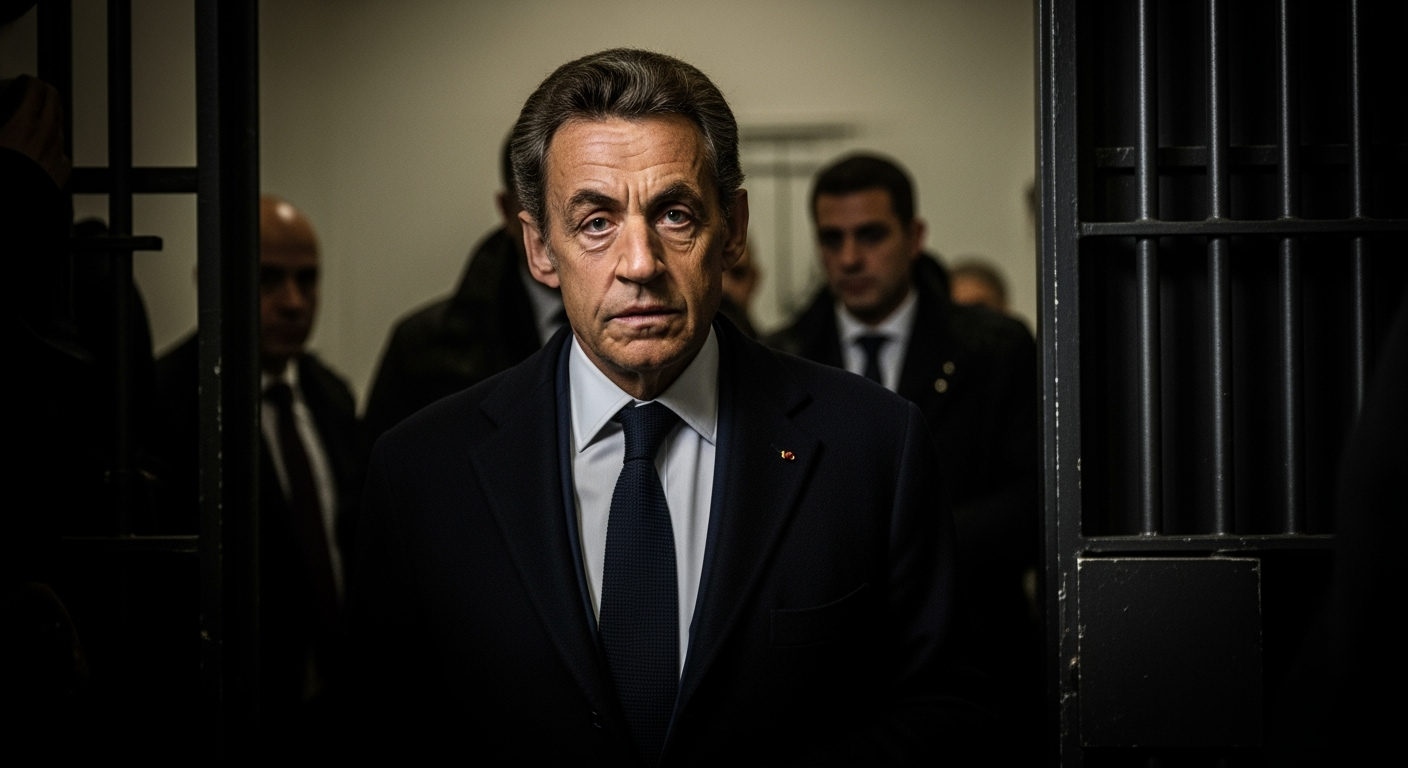Related Articles

Russia Intensifies Strikes on Ukraine's Energy Grid, Plunging Millions into Darkness Ahead of Winter

Chess World Mourns Loss of Grandmaster Daniel Naroditsky at 29





PARIS, France – Nicolas Sarkozy, the former President of France, arrived at a Paris prison today to begin serving a five-year sentence for criminal conspiracy related to efforts to secure illegal funding for his 2007 presidential campaign from the regime of late Libyan dictator Moamer Kadhafi. This marks a historic moment, as Sarkozy becomes the first former French postwar leader to be incarcerated. His journey from the Élysée Palace to La Santé prison culminates years of legal battles that have captivated and divided the nation.
The conviction stems from allegations that Sarkozy’s successful 2007 campaign illegally received millions of euros from Libya. Prosecutors described an alleged "pact of corruption" between Sarkozy, then interior minister, and Kadhafi, suggesting that in exchange for illicit financing, Sarkozy supported Libya's public rehabilitation on the international stage. Despite his vehement denials and ongoing appeals, the French legal system has upheld the verdict, asserting the gravity of the offenses and their potential to undermine public trust in democratic processes.
The accusations against Nicolas Sarkozy regarding Libyan financing for his 2007 presidential campaign first surfaced in 2011, with claims from a Libyan news agency and Muammar Kadhafi himself. Prosecutors alleged that Sarkozy knowingly benefited from a "corruption pact" with Kadhafi's government. This alleged arrangement involved millions in illegal financing, reportedly in exchange for Sarkozy's support in rehabilitating Libya's international image. Evidence presented during the trial included testimony suggesting that intermediaries transported suitcases filled with millions of euros in cash from Libya to Paris.
Sarkozy was found guilty last month of criminal conspiracy in this specific case and sentenced to five years in prison. The lead judge, Nathalie Gavarino, emphasized the "exceptional gravity" of the facts, stating they were "likely to undermine citizens' trust." While Sarkozy has maintained his innocence, describing his imprisonment as a "judicial scandal" and pledging to fight until his last breath, the court's decision underscores the judiciary's commitment to upholding campaign finance laws, regardless of a defendant's past political stature.
Beyond the Libyan funding allegations, Sarkozy has faced a parallel legal battle known as the "Bygmalion affair," concerning illegal financing of his failed 2012 re-election bid. This case involved accusations that his right-wing party, then known as the UMP (now Les Républicains), conspired with a public relations firm, Bygmalion, to conceal the true cost of his campaign through a system of false invoices. French law strictly limits presidential campaign spending to €22.5 million. However, prosecutors asserted that Sarkozy's 2012 campaign spent nearly €43 million, almost double the permitted amount, with Bygmalion allegedly billing the party instead of the campaign to bypass these limits.
Sarkozy was initially convicted in September 2021 in the Bygmalion case, receiving a one-year prison sentence, which was to be served under home confinement with an electronic bracelet. An appeals court in February 2024 confirmed the conviction but lightened his sentence to six months in prison with another six months suspended, also allowing for electronic surveillance. Sarkozy has appealed this ruling to the Court of Cassation, France's highest court, which is expected to rule in November. This ongoing legal challenge highlights the intricate and prolonged nature of the French judicial process, particularly for high-profile figures.
Nicolas Sarkozy's incarceration marks a significant moment in French political history. He is the first former French president of the post-war era to serve jail time. This development underscores the principle that no individual, regardless of their past office, is above the law in France. While other French leaders have faced legal troubles, Sarkozy's case represents the first instance of a former head of state beginning a custodial sentence.
The former president, who governed from 2007 to 2012, has consistently denied all charges across his various legal cases. His defense has often argued he was unaware of the financial intricacies handled by his campaign team, attributing blame to others. However, the judiciary has maintained that his role as a candidate and ultimately president carried responsibilities that could not be delegated or ignored. The legal battles have cast a long shadow over Sarkozy's post-presidency, despite his continued influence within conservative circles.
Sarkozy's legal team has indicated that they will continue to pursue appeals, including potentially referring the matter to the European Court of Human Rights. Under French law, some sentences can be implemented even while appeals are ongoing, which explains his current imprisonment despite the pending legal challenges. This situation has generated considerable public discussion, with supporters gathering outside his home to express solidarity, chanting his name and displaying messages of encouragement. Many see his conviction as an injustice, given his past service to the nation.
Conversely, proponents of the court's decision emphasize the importance of accountability and the rule of law. The judicial proceedings against Sarkozy, which have involved charges of corruption, bribery, influence-peddling, and illegal campaign financing, signal a robust commitment within the French legal system to scrutinize political conduct at the highest levels. As the appeals process continues, the case will undoubtedly remain a focal point of legal and political debate in France, further shaping the discourse around transparency and integrity in public office.
The imprisonment of Nicolas Sarkozy represents a profound development in French politics and jurisprudence. His conviction for criminal conspiracy related to illicit campaign funding from Libya, and the separate, but related, Bygmalion affair, illustrate the stringent application of campaign finance laws and the principle of equality before the law. While Sarkozy maintains his innocence and vows to exhaust all legal avenues for appeal, his entry into prison marks a historical precedent, reinforcing the accountability of even the highest public officials. The legal saga, spanning over a decade, has not only highlighted the complexities of political financing but also the enduring power of the judiciary to challenge and ultimately convict former leaders, leaving an indelible mark on France's political landscape.